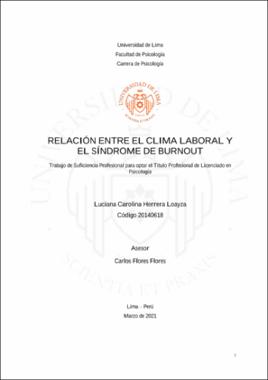| dc.contributor.advisor | Flores Flores, Carlos Eduardo | |
| dc.contributor.author | Herrera Loayza, Luciana Carolina | |
| dc.date.accessioned | 2021-08-10T23:30:14Z | |
| dc.date.available | 2021-08-10T23:30:14Z | |
| dc.date.issued | 2021 | |
| dc.identifier.citation | Herrera Loayza, L. C. (2021). Relación entre el clima laboral y el síndrome de burnout [Trabajo de suficiencia profesional para optar el Título Profesional de Licenciado en Psicología, Universidad de Lima]. Repositorio institucional de la Universidad de Lima. https://hdl.handle.net/20.500.12724/13828 | es_PE |
| dc.identifier.uri | https://hdl.handle.net/20.500.12724/13828 | |
| dc.description.abstract | El clima laboral puede afectar directamente al rendimiento, motivación y salud de manera inmediata, generando el síndrome de burnout. El objetivo de este trabajo es revisar la evidencia empírica de las investigaciones que relacionan clima laboral y el síndrome de burnout, así como la relación entre las dimensiones de ambas variables. Se realizó una búsqueda sistemática siguiendo las indicaciones de la guía PRISMA (Urrutia y Bonfill, 2013). Las bases de datos consultadas fueron Ebsco, Proquest y Psicodoc. Se seleccionaron para el análisis los trabajos que evaluaban el clima laboral y el síndrome de burnout (n = 7). La metodología utilizada en los estudios seleccionados fue de análisis transversales entre resultados obtenidos. Se obtuvo como resultado que la mayoría de las investigaciones reportaron relaciones estadísticamente significativas entre las dimensiones apoyo, autonomía e involucramiento laboral; y agotamiento emocional, despersonalización y realización personal. Se concluyó que existe una relación entre el clima laboral y el surgimiento del síndrome de burnout, lo cual responde a la pregunta de investigación planteada. Investigaciones futuras deben abarcar diseños longitudinales para obtener resultados con mayor precisión en un período prolongado de tiempo. | es_PE |
| dc.description.abstract | Work environment can directly affect performance, motivation and health immediately, generating burnout syndrome. The objective of this work is to review the empirical evidence of the investigations that relate the work environment and the burnout syndrome, as well as the relationship between the dimensions of both variables. A systematic search was carried out following the indications of the PRISMA guidelines (Urrutia and Bonfill, 2013). The databases consulted were Ebsco, Proquest and Psicodoc. The works that evaluated the work environment and burnout syndrome (n = 7) were selected for the analysis. The methodology used in the selected studies was cross sectional analysis between the results obtained. It was obtained as result that most of the investigations reported statistically significant relationships between the dimensions of support, autonomy and work involvement, and emotional exhaustion, depersonalization, and personal fulfillment. It was concluded that there is a relationship between the organizational climate and the emergence of the burnout syndrome, which answers the research question raised. Future research should encompass longitudinal designsto obtain more accurate results over a long period of time. | en_EN |
| dc.format | application/pdf | |
| dc.language.iso | spa | |
| dc.publisher | Universidad de Lima | |
| dc.rights | info:eu-repo/semantics/openAccess | * |
| dc.rights.uri | https://creativecommons.org/licenses/by-nc-sa/4.0/ | * |
| dc.source | Repositorio Institucional - Ulima | es_PE |
| dc.source | Universidad de Lima | es_PE |
| dc.subject | Burnout syndrome | en_EN |
| dc.subject | Work environment | en_EN |
| dc.subject | Condiciones de trabajo | es_PE |
| dc.subject | Síndrome de burnout | es_PE |
| dc.title | Relación entre el clima laboral y el síndrome de burnout | es_PE |
| dc.type | info:eu-repo/semantics/bachelorThesis | |
| thesis.degree.level | Título Profesional | es_PE |
| thesis.degree.discipline | Psicología | es_PE |
| thesis.degree.grantor | Universidad de Lima. Facultad de Psicología | es_PE |
| dc.publisher.country | PE | |
| dc.type.other | Trabajo de suficiencia profesional | |
| thesis.degree.name | Licenciado en Psicología | es_PE |
| renati.advisor.orcid | https://orcid.org/0000-0001-9749-9212 | |
| renati.discipline | 313016 | |
| renati.author.dni | 74469729 | |
| renati.level | https://purl.org/pe-repo/renati/level#tituloProfesional | * |
| renati.advisor.dni | 22304972 | |
| renati.juror | Flores Flores, Carlos Eduardo | |
| renati.juror | Valle Vera, María Liliana | |
| renati.type | https://purl.org/pe-repo/renati/type#trabajoDeSuficienciaProfesional | * |
| dc.subject.ocde | https://purl.org/pe-repo/ocde/ford#5.01.00 | |
| ulima.cat | OI | |



